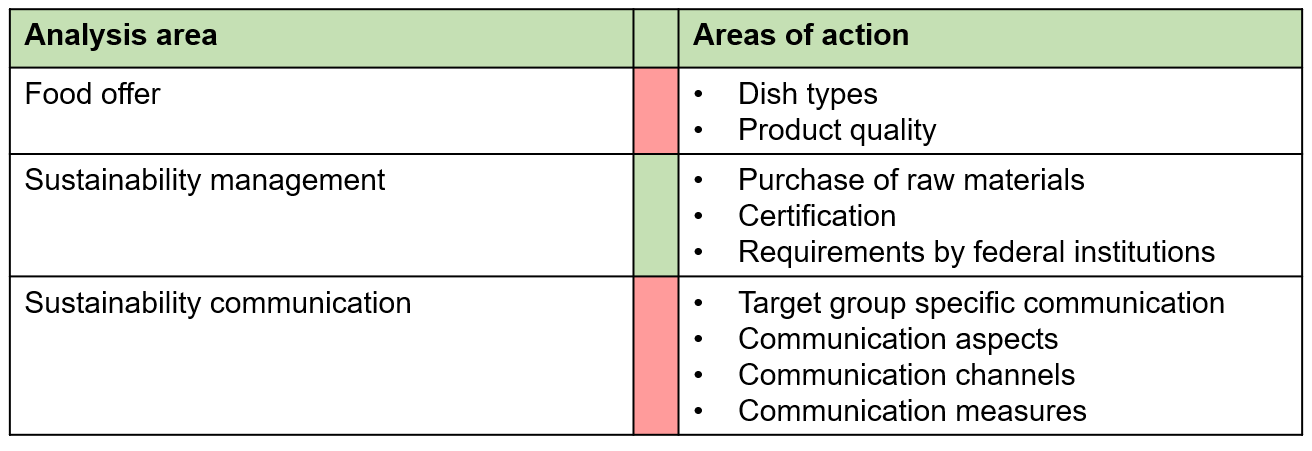Sustainable nutrition is a major contributor to sustainable development. But how sustainable are the canteens at the federal level?
Master thesis by Svea Spieker
3. Semester, 2021
Supervising lecturer: Prof. Dr. Torsten Schäfer
Media, Technology and Society
Problem and initial situation
The importance of sustainability in our society is increasing because social and ecological problems are becoming increasingly serious (cf. Schleer, 2014, p. 1). The Western diet has a significant influence on this: it is responsible for almost a quarter of all greenhouse gas emissions, various diet-related diseases, food waste, child and forced labour, … (cf. Koerber, 2014, p. 262; cf. Sieveking; Schomerus, 2020, p. 681; cf. Techniker Krankenkasse, 2017, p. 44; cf. Willett et al., 2019, p. 1 f.). However, since nutrition is essential for survival and the consumption of resources can therefore not be completely avoided (cf. Liedtke; Speck; Mourabit, 2018, p. 55), the sustainable design of nutrition is essential. This transformation process towards a diet within health and planetary boundaries is referred to as a nutritional change (cf. EAT, n. y., p. 5). In principle, all social actors such as citizens, companies or the government need to participate (cf. Zimmermann, 2016, XVI) in order to create a successful nutritional change. The only question is which part of food value chain can be chosen as an influential starting point? Especially the popular communal catering has great potential to establish sustainable nutrition socially (cf. Göbel et al., 2017, p. 17) and to achieve changes along the entire value chain (cf. Teitscheid et al., 2018, p. 17).
Research question
At the same time, the federal government, as the highest state authority in the public interest, also has a role model function. Initial attempts to implement sustainability already exist, as shown for example by Article 20a of the Basic Law, the German sustainability strategy or the nutrition policy. However, how sustainable the diet is in federal institutions has so far only been examined in a small data collection by the Green Party in 2019 (see German Bundestag, 12.09.2019). On the initiative of the World Food Institute, the study conducted as part of a Master’s thesis at the Darmstadt University of Applied Sciences followed up on the data collection of Bündis 90/Die Grünen and examined the extent to which the German Federal Government is acting as a role model:
How is sustainability and sustainability communication practised in the canteens of the federal government and what possibilities are there for improvement with regard to the food revolution?
To investigate this research question, various research sub-questions and hypotheses were defined:

Figure 1: Overview of research questions and hypotheses
Methods
In a multi-step procedure, a theoretical basis was first laid. This was then used as the basis for determining the target and actual status of sustainability in federal canteens. In a final target-actual comparison, the sustainability of the federal canteens was assessed.

Figure 2: Research process of the master thesis and use of the methods
Results
The results of the study show that there is a great need for action, especially in the areas food offer and sustainability communication. While meat and fish end up on the plate too often and in too large quantities, vegetarian and vegan dishes are offered too rarely. In addition, product quality should be improved regarding the characteristics organic, regional, seasonal and fair trade. In terms of sustainability communication, the study shows that communication is not designed specifically for the target group and that the entire range of communication aspects, channels and measures are rarely used. This results in a lot of unused potential in the federal canteens to positively influence the decision-making process of the diner.
Within the study the best results were achieved in the analysis area of sustainability management. Particularly in the areas of measures along the value chain, menu planning, procurement of sustainable fish and meat and the use of a sustainability management system, there is a great correspondence between actual and target. However, the canteens should work on their purchasing and make greater use of smaller, local suppliers and farmers in the future. Increased certification of the canteens also makes sense. It is also a cause for concern that only one third of the canteens have standards for sustainability prescribed by the respective federal authority.

Figure 3: Need for action in the individual areas of food offer, sustainability management and sustainability communication
Conclusion
The many discrepancies show that despite initial approaches, most federal canteens are not acting as sustainable as they should in terms of the nutritional change. It is praiseworthy for the canteen operators that apparently all sustainability commitment is implemented on their own and only rarely supported by binding requirements from the federal government. This finding is in line with the results of the Bündis 90/Die Grünen survey, but nevertheless raises the question: How can the federal government commit itself to taking responsibility for future generations in Article 20a of the Basic Law, work on the implementation of the German sustainability strategy and advocate a healthy and sustainable world nutrition with its food policy, but at the same time not ensure sufficient sustainability in its own company restaurants?
The bottom line is that the German government is failing in its function in several aspects with this contradictory behaviour: it is not acting as a social role model for nutritional change and is not making a sufficient contribution to sustainability in its own canteens. In addition, the opportunity to educate its own employees and thus the population as well as to establish universally applicable sustainability standards remains unused. The federal government’s own learning process and knowledge gain for the implementation of sustainable nutrition is also diminished.
Although the federal government has so far not been committed enough when it comes to sustainability in its own canteens, it is never too late to change something. At the federal level, the survey results can draw attention to the weak points and motivate to develop sustainability standards for the canteens as well as support the canteens in implementing them. Canteen operators can use the results as a reference for an individual analysis of the current situation and the development of measures.
The following applies to all actors: Every measure counts. Stay motivated – we can only do it together!
Literature List
Deutscher Bundestag (Hrsg.) (12.09.2019): Nachhaltige Ernährung in Gemeinschaftsverpflegungen des Bundes, URL: https://dipbt.bundestag.de/dip21/btd/19/131/1913166.pdf [Access on 31 January 2021].
EAT (n. y.): Food Planet Health: Healty Diets From Sustainable Food Systems, URL: https://eatforum.org/content/uploads/2019/01/EAT-Lancet_Commission_Summary_Report.pdf [Access on 16 April 2021].
Göbel, Christine et al. (2017): Entwicklung eines Leitbilds zur „Nachhaltigkeit in der Außer-Haus-Gastronomie“, in: Walter Leal Filho (Hrsg.), Innovation in der Nachhaltigkeitsforschung, 2017, pp. 1–21.
Koerber, Karl von (2014): Fünf Dimensionen der Nachhaltigen Ernährung und weiterentwickelte Grundsätze – Ein Update, in: Ernährung im Fokus, pp. 260–268.
Leal Filho, Walter (Hrsg.) (2017): Innovation in der Nachhaltigkeitsforschung, Berlin, Heidelberg: Springer Berlin Heidelberg.
Liedtke, Christa; Speck, Melanie; Mourabit, Xenia El (2018): Ressourcenleichte Gesellschaft: Welchen Anteil kann die Gemeinschaftsverpflegung leisten?, in: Petra Teitscheid; Nina Langen; Melanie Speck; Holger Rohn (Hrsg.), Nachhaltig außer Haus essen: Von der Idee bis auf den Teller, 2018, pp. 50–58.
Schleer, Christoph (2014): Corporate Social Responsibility und die Kaufentscheidung der Konsumenten, Wiesbaden: Springer Fachmedien Wiesbaden.
Sieveking, Annelie; Schomerus, Thomas (2020): Beiräte als Instrument einer Ernährungswende – Die Etablierung von Ernährungsräten in Deutschland, in: NuR 42. 10, pp. 680–686.
Techniker Krankenkasse (2017): Iss was, Deutschland: TK-Studie zur Ernährung 2017
Teitscheid, Petra et al. (Hrsg.) (2018): Nachhaltig außer Haus essen: Von der Idee bis auf den Teller, München: oekom.
Teitscheid, Petra et al. (2018): Projektkontext NAHGAST – Transition zu einer nachhaltigen Außer-Haus-Gastronomie, in: Petra Teitscheid; Nina Langen; Melanie Speck; Holger Rohn (Hrsg.), Nachhaltig außer Haus essen: Von der Idee bis auf den Teller, 2018, pp. 16–20.
Willett, Walter et al. (2019): Food in the Anthropocene: the EAT–Lancet Commission on healthy diets from sustainable food systems, in: The Lancet 393. 10170
Zimmermann, Friedrich M. (Hrsg.) (2016): Nachhaltigkeit wofür?, Berlin, Heidelberg: Springer Berlin Heidelberg.



